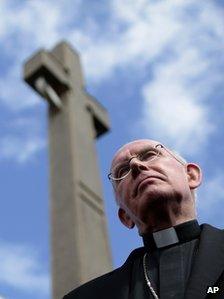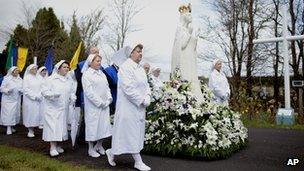Irish anti-abortion vigil at Knock draws thousands
- Published

Cardinal Brady called on Catholics to oppose the draft abortion bill
Cardinal Sean Brady has urged 5,500 people at an anti-abortion prayer vigil in the Irish Republic to lobby their politicians over a draft abortion bill.
The Archbishop of Armagh and Primate of All Ireland said people must avoid "ambiguous language which cloaks the true horror of the situation".
He was addressing crowds at the Marian shrine of Knock in County Mayo.
It was the second time in 24 hours the Catholic Church had criticised the government over its draft legislation.
Earlier this week, the Irish cabinet reached agreement on its proposed Protection of Life in Pregnancy Bill that, for the first time, includes the credible threat of suicide as grounds for a legal termination in the Republic.
'Morally unacceptable'
At present, medical staff in the Republic cannot terminate a pregnancy unless there is a threat to the life - as opposed to the health - of a pregnant woman.
Irish Taoiseach Enda Kenny said the draft bill would bring certainty to pregnant women and legal clarity to doctors.
However, on Friday the Irish Catholic Bishops' Conference said the proposed bill was a "dramatic and morally unacceptable change to Irish law".
They released a statement, external saying that if the legislation was approved it would "make the direct and intentional killing of unborn children lawful in Ireland".
Addressing a prayer vigil for mothers and the unborn at the Marian shrine on Saturday, Cardinal Brady said: "We live in a twilight sort of world where, unfortunately, the perception of the seriousness of abortion - has grown progressively obscured in the minds of many of our contemporaries.
"In this Mass we pray for courage - the kind of courage that is needed to look the truth in the eye and to call it as it is, without yielding to self-deception or bowing to convenient compromise, scrupulously avoiding ambiguous language which cloaks the true horror of the situation and reduces its seriousness in public."
Cardinal Brady said the Catholic Church was planning to "mobilise" and make people aware of the very important issues at stake in the abortion debate.
'Serious choice'
He repeated his call for voters to oppose any change to the law by lobbying their elected representatives.
The homily was delivered by Bishop Brendan Leahy of Limerick, who told the pilgrims that Irish society was "faced with a serious choice".
Bishop Leahy said: "It is very possible that an abortion regime will be introduced into this country, thereby for the first time overturning in law the fundamental principle of the inviolability of innocent human life.
"For the sake of the common good, Catholics need to propose their view on this topic."
The bishop said it has been long-established in Catholic teaching that medical treatment of mothers whose lives are in danger "is permissible even if this results in the unintended death of the child in the womb".

The prayer vigil for mothers and the unborn at the Marian shrine of Knock included a rosary procession
However, he told the crowds that "the direct taking of the life of an unborn child cannot be justified on the grounds of intention in the case of a mother's threatened suicide" which he said "ought to be treated by other means".
He said if pregnant women felt their lives were in danger due to suicidal thoughts then their safety should be ensured by "providing the appropriate psychiatric and psychological intervention, medication, nursing and social support".
Bishop Leahy added that people in Ireland needed "both to affirm our conviction that abortion is never the solution while at the same time re-launching Ireland's care of mothers and babies".
Under pressure
He said there was "a lesson to be learnt from the experience of other countries that started down the path of abortion legislation".
He told the pilgrims: "Around 97% of the nearly 200,000 abortions in England and Wales in 2011 were on mental health grounds. Such a statistic was in no way envisaged when abortion was first introduced there."
In figures published last year, the UK Department of Health said that in 2011, the vast majority (98%, or 185,973) of abortions in England and Wales were undertaken under statutory ground C, where "the pregnancy has not exceeded its 24th week and that the continuance of the pregnancy would involve risk, greater than if the pregnancy were terminated, of injury to the physical or mental health of the pregnant woman".
The prayer vigil for mothers and unborn children was advertised in Catholic churches and parishes in recent weeks.
The Irish government has been under pressure to clarify its abortion laws following the death of Savita Halappanavar last October.
The 31-year-old died from infection at University Hospital Galway after a miscarriage; her family said she would have survived had doctors granted her requests for an abortion.